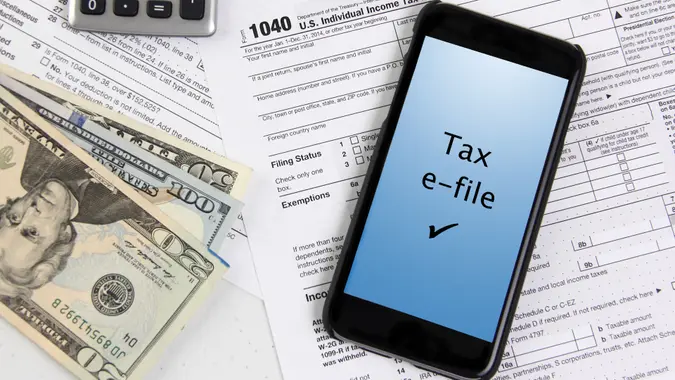Are Medical Expenses Tax-Deductible?

Commitment to Our Readers
GOBankingRates' editorial team is committed to bringing you unbiased reviews and information. We use data-driven methodologies to evaluate financial products and services - our reviews and ratings are not influenced by advertisers. You can read more about our editorial guidelines and our products and services review methodology.

20 Years
Helping You Live Richer

Reviewed
by Experts

Trusted by
Millions of Readers
Medical bills can be stressful, but they might offer a silver lining come tax time. Medical expenses are tax deductible — but only if you itemize and your eligible costs exceed 7.5% of your adjusted gross income. While not every health-related expense qualifies, knowing which ones do can help reduce your tax bill and ease the burden of high medical costs.
Who Can Deduct Medical Expenses?
The IRS permits you to deduct the portion of your medical expenses that exceeds 7.5% of your adjusted gross income, or AGI.
“To take advantage of this, you must itemize your medical expense deductions on your IRS 1040,” said Danielle K. Roberts, Medicare insurance expert and co-founder of Boomer Benefits. “Make sure that the total of all itemized deductions is more than the standard deduction or it won’t benefit you.”
What Medical Expenses Are Deductible?
The IRS allows a broad range of deductible expenses, including:
- Doctor, dentist, surgeon, chiropractor and mental health provider fees
- Prescription medications and insulin
- Medical equipment and supplies, like crutches, glasses and hearing aids
- Hospital and lab services
- Long-term care and certain premiums
- Breast pumps, wheelchairs and other medically necessary equipment
- Stop-smoking programs
- Costs of service animals
- Transportation and lodging related to medical care
For a complete list of deductible medical expenses, check IRS Publication 502.
Medical Expenses That Aren’t Deductible
Not every expense you see as medically related is one that the IRS would agree with. You can’t deduct:
- Cosmetic surgery — unless due to a trauma or illness
- Over-the-counter medications, except insulin
- Teeth whitening
- Diet foods
- Travel for rest or vacation
- Funeral expenses
- Medical expenses reimbursed by insurance
How To Calculate Your Medical Expense Deduction
You can use these steps to calculate your deduction:
- Determine your AGI from line 11 of Form 1040.
- Multiply your AGI by 7.5% or 0.075. That’s your threshold.
- Add up all eligible medical expenses.
- Subtract the 7.5% threshold. The remainder is your deduction.
Deduction Example
Say your AGI is $50,000. Multiply that by 7.5% to get $3,750. That’s the threshold your medical expenses must exceed.
If you had $6,500 in qualified medical expenses, you could deduct the difference — or $2,750 — if you itemize on your return.
Health Insurance Premium: What Counts and What Doesn’t
If you’re self-employed, or are a more-than-2% shareholder of an S corporation from which you earned income, you may be able to deduct 100% of health insurance premiums you pay for yourself and family members. It won’t be an itemized deduction, though. Instead, you’ll make an adjustment to income, using Form 1040 instructions to calculate your deduction.
For most W-2 employees, it isn’t the same. If you have an employer-sponsored health insurance plan that’s paid pre-tax through a cafeteria plan or premium conversion plan, you can’t deduct health insurance premiums.
Common Misconceptions About Medical Expense Deductions
You don’t want to overstate deductions or claim deductions you don’t actually qualify for because you could face an accuracy-related penalty from the IRS, generally equal to 20% of the underpaid tax.
You also don’t want to assume that your specific medical expense is taxable. You can check IRS Publication 502 to see what is tax-deductible. That way, you can map out things ahead of time and see if your expenses are above 7.5% of your AGI.
Other Ways To Save on Medical Expenses
Unfortunately, not everyone will be able to itemize their medical expenses. But there are other tax-advantaged options that can help you save on these costs. Here are a few to consider.
Health Savings Account
- Type of savings account where you set aside pretax funds to pay for qualifying medical costs.
- Can only contribute if you have an eligible high-deductible health plan.
- Funds roll over from year to year.
Flexible Spending Account
- An FSA uses pretax dollars for medical expenses.
- Funds must be used within the year — some exceptions apply.
Health Reimbursement Arrangement
- Funded by employers
- Reimburses qualified expenses tax-free.
- May roll over unused amounts
Is It Worth Claiming Medical Expenses on Taxes?
It depends on your situation. You must itemize to claim the deduction, and your expenses must exceed 7.5% of your AGI. If you don’t qualify, tax-advantaged accounts like HSAs or FSAs may offer better savings.
Terence Loose, Daria Uhlig, Cynthia Measom, Elizabeth Constantineau, Cody Bay and Michael Keenan contributed to the reporting for this article.
Our in-house research team and on-site financial experts work together to create content that’s accurate, impartial, and up to date. We fact-check every single statistic, quote and fact using trusted primary resources to make sure the information we provide is correct. You can learn more about GOBankingRates’ processes and standards in our editorial policy.
- IRS. "Medical and Dental Expenses."
- IRS. "Publication 502, Medical and Dental Expenses."
- IRS. "Publication 502 — Medical and Dental Expenses."
- IRS. "Accuracy-Related Penalty."
- IRS. "Publication 969, Health Savings Accounts and Other Tax-Favored Health Plans."
- IRS. "Credits and Deductions for Individuals."
 Written by
Written by  Edited by
Edited by 























